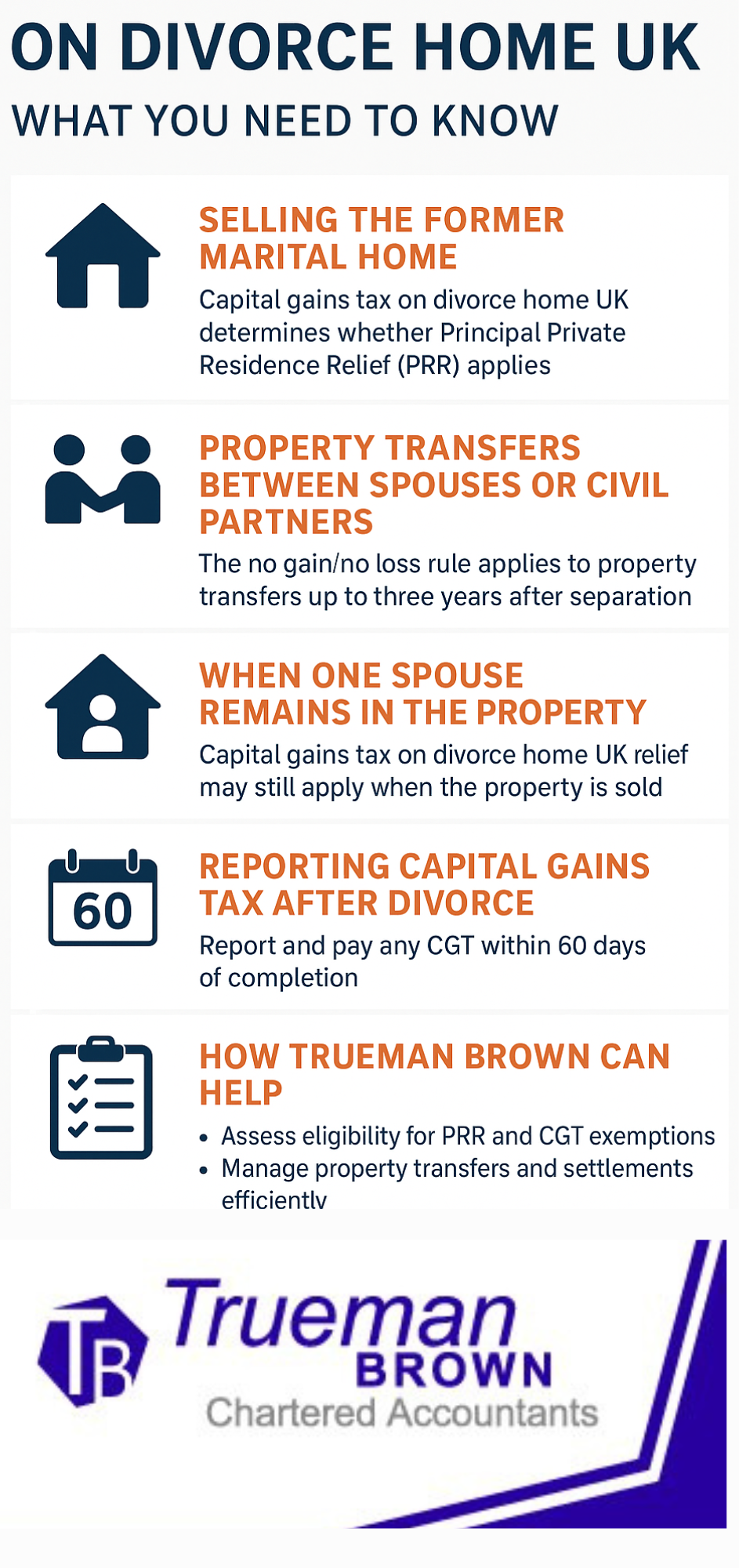Capital Gains Tax on Divorce Home UK: What You Need to Know
When couples separate or divorce, one of the biggest financial questions is how capital gains tax on divorce home UK rules apply.
Understanding how the family home is treated can help you avoid unexpected tax bills and make informed decisions about property transfers and sales.
Selling the Former Marital Home
If the marital home is sold to a third party, capital gains tax on divorce home UK rules determine whether Principal Private Residence Relief (PRR) applies.
From April 2023, the departing spouse can continue to benefit from PRR until the property is sold, provided the other spouse still lives there and no election has been made for another main residence.
Transfers Between Spouses or Civil Partners
The no gain/no loss rule now applies to property transfers between spouses or civil partners up to three years after separation, or without time limit if the transfer is made under a formal divorce or separation agreement.
This change gives divorcing couples more flexibility and ensures capital gains tax on divorce home UK does not create unintended tax charges during settlement.

When One Spouse Remains in the Home
If one party stays in the family home until children reach adulthood, capital gains tax on divorce home UK relief can still apply when the property is eventually sold.
The departing spouse retains PRR eligibility as long as the property remains the main home of the other spouse and no alternative residence has been elected.
Capital Gains Reporting and Deadlines On Capital gains tax on divorce home UK
From 2024, individuals selling property in the UK must report and pay any CGT within 60 days of completion.
Even if no tax is due under capital gains tax on divorce home UK reliefs, you may still need to file a return to HMRC.
It’s important to seek professional advice to ensure compliance and avoid penalties.
How Trueman Brown Can Help You With Capital gains tax on divorce home UK
Navigating capital gains tax on divorce home UK rules can be complex, especially during emotionally challenging times.
Trueman Brown Chartered Accountants specialise in tax and property matters, helping clients:
-
Assess eligibility for PRR and CGT exemptions
-
Manage property transfers and settlements efficiently
-
Prepare and file HMRC CGT reports accurately
-
Optimise your tax position through professional planning
📧 mark@truemanbrown.co.uk
📞 01708 397262
Our expert accountants are here to provide clarity, reduce stress, and ensure you make tax-smart decisions during your divorce or property settlement.
FAQs: Capital Gains Tax on Divorce Home UK
1. Do I pay capital gains tax if I transfer my home to my ex-spouse?
Usually no — transfers between spouses or civil partners within three years of separation, or under a court order, are exempt from CGT.
2. What happens if I move out but my ex stays in the house?
You may still qualify for PRR until the house is sold, provided your ex-spouse continues to live there and you don’t elect another main residence.
3. How is capital gains tax calculated on a divorce home?
It’s based on the increase in value between acquisition and disposal, minus any available reliefs or exemptions such as PRR.
4. Do I need to report the sale to HMRC?
Yes — even if no tax is payable, a CGT return must usually be submitted within 60 days of the sale.
5. Can accountants help reduce my CGT bill?
Yes — professionals like Trueman Brown can identify applicable reliefs, structure transfers efficiently, and manage your tax reporting.

Recent Comments